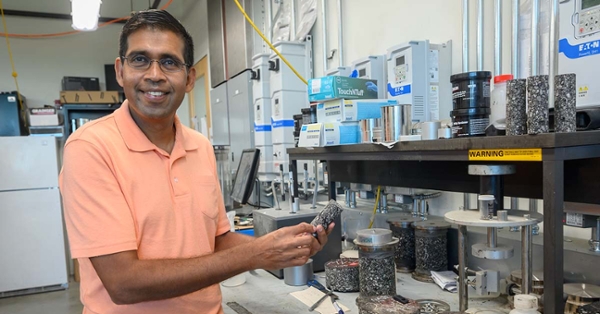Designing longer-lasting, sustainable roadways for New Jersey
Designing longer-lasting, sustainable roadways for New Jersey

Rowan University’s Center for Research and Education in Advanced Transportation Engineering Systems (CREATES) is retained by New Jersey Department of Transportation (NJDOT) as an academic partner to perform research for innovative materials and technologies to assist in making longer-lasting, more cost-effective, and sustainable pavements.
The founders of CREATES include Yusuf Mehta, Ph.D., the director of CREATES, and Ayman Ali, Ph.D., the associate director of CREATES, who both have established expertise in pavement design and highway materials research areas.
This contract agreement will provide technical assistance to the state agency as they execute projects, some of which may stem from the infrastructure law. Mehta said that “this contract agreement will serve as a catalyst for CREATES to conduct implementable pavement research in other neighboring and mid-Atlantic states as well.”
“CREATES has become an impressive multifaceted center with unique capabilities,” said Dean Giuseppe Palmese, “and it is good to see how the Henry M. Rowan College of Engineering is supporting the state of New Jersey’s infrastructure priorities in this way.”
Pavement is one of the most important and valuable assets of the surface transportation infrastructure. As a part of this contract agreement, CREATES is a leading research center that focuses on eight subject areas: innovative materials, innovative technologies, pavement management system, pavement design procedures, life-cycle cost analyses, pavement policy research, technology transfer, and on-call services.
“We’re looking into different types of innovative materials and recycling technologies in which you’re reusing some of the existing materials to build new roads and highways, making them more sustainable,” Ali said. “That, however, must not come at the expense of ensuring their cost-effectiveness, long-lasting performance, and ultimately the safety of the traveling public.”
CREATES researchers will work closely alongside the NJDOT to refine current pavement design technologies, conduct research that will help support pavement policies of the agency, and provide recommendations to update the well-established Pavement Management System that NJDOT operates. This will enable the agency to make better informed decisions based on the current and predicted conditions of roadways.
“The Pavement Management System is a way for us to monitor the health of existing infrastructure,” Ali said. “If there is a certain roadway that needs to be repaired, the Pavement Management System will guide you. If there is an effective treatment that we want to apply, such as a new pavement mix, once NJDOT constructs the treatment, then we can track its performance and be able to make decisions based on whether it’s performing well or not.”
One of the most exciting aspects of the research, according to Mehta and Ali, is that the solutions must be quickly implementable. The CREATES team will assist NJDOT, as needed in their pavement support needs.
“They want solutions that are economical, practical, sustainable, high performing, and implementable,” Mehta said.